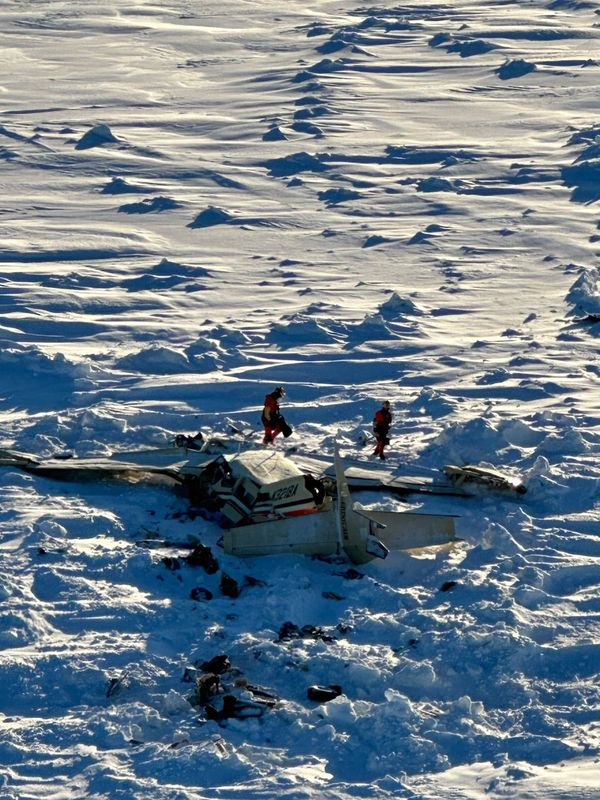The vertical rock columns of Mount Roland loom large over the historic north-west Tasmanian town of Sheffield.
The small town draws tourists from the Spirit of Tasmania to see its colourful murals.
For visitors, a horse and cart in place of white utilities would seem fitting in the wide main street littered with historic buildings.
Some shops have been run by the same family for five generations.
But as the COVID-19 pandemic slows visitation to the town, there are those looking for new ways to get people pulling up for scones and tea — and they all rest on Mount Roland.
Business owner Des Brown has been waiting to see a cableway up the mountain for 22 years, and is hopeful it might finally come to fruition.
"I think there are more people now seeing that it would be a good goer," he said.
"We've demonstrated right across the world that you can do these things sensibly and sustainably."
A proposal for a 13-cabin gondola cableway on Mount Roland and an adventure precinct is listed on the state government's controversial expression of interest list for developments in Tasmania's parks and reserves.
The cableway would take people directly to the summit of the mountain, where they could engage in "mountain-based activities", the proposal says.
This includes a mountain bike network built by the same company behind the Maydena and recently opened Queenstown trails.
Local Larina Chester thinks the idea is a great fit for the town.
"I think it's a good idea, how much fun," she said.
"I think it would help immensely with the traffic flow through here because when it gets quiet, it's quiet and I think something like this would really help bring people into the town and help boost the economy."
Calls for state government to step in
It is not the only cable car proposal in the state.
Hobart has been grappling with the prospect of cableway to the summit of kunanyi/Mount Wellington for about a century, with strong voices for and against the proposal.
In July, the Hobart City Council voted to reject the development application because it would diminish the recreational, cultural, tourism and landscape value of the iconic mountain.
Mr Brown said he wanted the public to have a say in the projects.
"Where you've got special projects, keep them out of where everyone's dogfighting, but let the people have a say democratically."
The local Aboriginal community also wants the government to step in. However, it wants projects like the cableway ruled out.
"It's been on-and-off discussion for many years now. I like when it's off and not on," Dave mangenner Gough, a local Aboriginal man and chair of Six Rivers Aboriginal Corporation, said.
"I'm surprised that it never seems to go to rest, it seems to be just a few people that want to drive this idea and concept which is such an outdated and inappropriate thing for today.
"The government needs to … be aware that this is something that will drain money, it'll drain resources and it'll impact people with no positive outcome."
'A sacred mountain'
Mr Gough said Mount Roland was significant for Aboriginal people, likening the proposal to building a cableway on Uluru.
"Sacred mountains should be walked on lightly and they should not have any mechanisms or ways that obscure it, or take away from it," he said.
"If you can't walk lightly and leave it better than you found it you shouldn't go near it."
He said around the mountain was once a significant trade route.
"That area where Mount Roland is and those other mountain ranges are trade routes for many families who traded through those areas for thousands of years," he said.
"It affects from our ancestors to us and our future generations."
He also thinks the development would detract from the reasons visitors come to Mount Roland.
"People come to our country and our landscapes to visit natural and culturally strong environments … not to get on a mechanical device to go up to a mountain."
Artist and business owner Mark Beech-Ross said the development was inevitable, and this way the Kentish community could be in control of what that looked like.
"What it's about is local people taking control of the tourism industry," he said.
"To have a tourism set-up that is owned by locals, that provides opportunities for locals, it's not owned by the big corporations which are controlled from Sydney, or from Singapore, or from anywhere else in the world."
Making the mountain accessible
The idea for a cableway up the mountain is not new, with the council starting a cableway project in 1999.
Mr Brown said the mountain was surveyed at the time for a cableway and road.
"At the time that was to establish a taskforce and we had people within the state government departments … and it was a shame that it was just left and died," he said.
A cableway proposal surfaced again in 2011, where a UTAS report for Mount Roland Steering Committee stated the main issue limiting visitation to the mountain was accessibility.
The report also suggested that a cableway and mountain biking on the mountain would "likely deliver considerable benefit to the Kentish municipality".
Sheffield business owner Leanne Tamas said a cableway would mean everyone could enjoy the mountain, regardless of age or disability.
"I haven't been up there myself, but they say you can see the sea once you're up the top, so it's a no brainer," she said.
However, Mr Gough thinks there are other ways people with limited mobility could experience the mountain — through things like audio-visual experiences.
A Tasmanian Parks and Wildlife spokesperson said the proponent now needs to seek a Reserve Activity Assessment (RAA), a process that includes public consultation.
"No RAA has been prepared and no lease or license has been issued," the spokesperson said.







